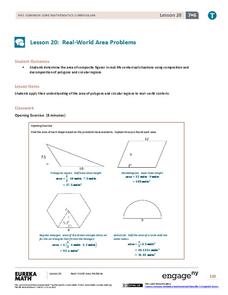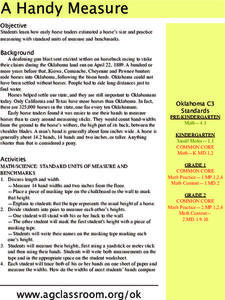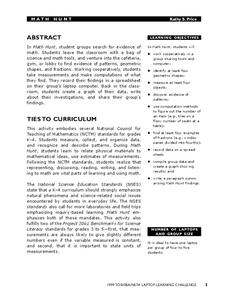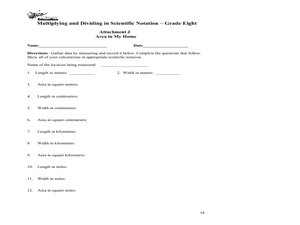Space Awareness
What is Time?
Does it ever seem like time is slipping through your fingers? Model the passing of time with an hourglass activity in which individuals determine whether hourglasses are the most efficient way to measure time.
Science Matters
Richter Scale
The 12th lesson in a series of 20 opens with a demonstration of exponential functions using pasta. This concept is connected to the Richter Scale, which is also an exponential function. Scholars compare the exponential scale that...
EngageNY
Real-World Area Problems
Not all structures take the shape of a polygon. The 21st lesson in a series of 29 shows young mathematicians they can create polygons out of composite shapes. Once they deconstruct the structures, they find the area of the composite figure.
EngageNY
Cones and Spheres
Explore methods for finding the volume of different three-dimensional figures. The 20th instructional activity in the 25-part series asks learners to interpret diagrams of 3-D figures and use formulas to determine volume. Scholars must...
EngageNY
Converse of the Pythagorean Theorem
Discover a new application of the Pythagorean Theorem. Learners prove and apply the converse of the Pythagorean Theorem in the 17th lesson in a 25-part series. The examples ask learners to verify right triangles using the converse of the...
EngageNY
The Distance from a Point to a Line
What is the fastest way to get from point A to line l? A straight perpendicular line! Learners use what they have learned in the previous lessons in this series and develop a formula for finding the shortest distance from a point to a...
Curated OER
Handy Measurement: Using Non-Standard Measuring Tools
Students examine different types of non-standard measurement. In this measuring lesson, students utilize their fingers, palms and feet as measuring tools. Students discuss the difference between measuring using parts of their body and...
Curated OER
Mind Your Pints and Quarts: Making Sense of Liquid Measurement
Elementary and middle schoolers identify different units of liquid measurement. They use the online Visual Thesaurus to learn about the relationships between units of liquid measurement.
Curated OER
Measure: Bearings and Scale Drawings
Pupils practice drawing geometric figures. In this geometry lesson, learners complete an activity that requires them to draw angles and shapes to the nearest degree.
Curated OER
Measuring, Drawing and Naming Angles
Upper graders examine all angles. In this angle lesson, pupils practice measuring, drawing, and naming angles. They create posters regarding angle vocabulary.
Curated OER
Math and Measurement
Engage the class in exploring linear measurement and map scales. They work in groups to measure various distances in the classroom and convert measurements to other units as directed by the teacher. To access this Word document, click on...
Curated OER
Poolroom Math
Students identify, name, and measure angles using playing pool as a motivator in this instructional activity. They measure, define, and label different angles. They then discuss how their knowledge about angles could be used in a game of...
Curated OER
Math-Geometry: Area and Perimeter
Upper graders measure the area and perimeter of several items. In this area and perimeter lesson plan, learners engage in measuring area and perimeter in several scenarios. Full-group instruction requires students to listen to...
Curated OER
Shaquille O'Neal Hand & Foot Span
If Shaquille O'Neal wears a size-20 shoe, how big are his hands? Learners will use the average ratios of foot length to hand span to calculate the hand span of Shaq, but first, they have to collect the data! They will measure their peers...
Curated OER
Energy Audit
Learners collect data about energy usage and use mathematical calculations to analyze their data. In this energy conservation and statistics math instructional activity, students survey their homes to complete an energy usage worksheet....
Curated OER
Measure Mania
Groups of students rotate through five classroom stations to estimate, measure, and record volume, length, weight, mass, and area using both customary and metric measure. They evaluate their data to determine how close their estimates...
Curated OER
Measuring Area: Sensible Flats
Here's how to calculate the areas of polygonal figures. In this measuring area lesson, upper graders use hash marks to create and count square units. They also problem solve a cyberchase activity watching Quicktime videos.
Curated OER
Dinosaur Math
Second graders practice vocabulary related to measurement, mathematics, and dinosaurs. Using the engaging topic of dinosaurs, learners will calculate various information about dinosaurs and use measurement vocabulary. They will also...
Curated OER
A Handy Measure
Hold your horses! Young learners discover the history behind measuring the height of horses "by hands." They also study the history of Oklahoma, and how horses played such an important role in settling the state. An excellent worksheet...
Curated OER
Math Hunt
Go on a scavenger hunt around your school to find evidence of math. Investigate different areas of your school for patterns, fractions, and different geometric shapes. Finally, create a spreadsheet and plot the data you've collected.
Curated OER
A Weigh we Go!
Here are some cross-curricular activities whil should help your kids understnad weight measurements and grammar. In this grammar and math lesson, students read the book Skittles Riddles and practice counting and balancing skittles. They...
Curated OER
Economic Goals and Measuring Activity
Explore the role of government in the economy market. Young scholars analyze the economic decision-making process and how it takes into consideration additional cost, benefits, and public awareness of what they are trying to accomplish....
Virginia Department of Education
Calculating Measures of Dispersion
Double the fun — calculate two measures of deviation. The lesson plan provides information to lead the class through the process of calculating the mean absolute deviation and the standard deviation of a data set. After learning how to...
Ohio Department of Education
Multiplying and Dividing in Scientific Notation - Grade 8
Here is really nice set of resources on scientific notation. Eighth and ninth graders explore the concept of multiplying and dividing in scientific notation. In this multiplying and dividing numbers in scientific notation instructional...

























